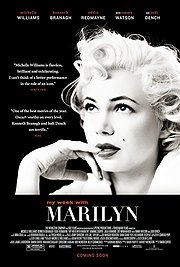My Week With Marilyn

The title serves this film well; Colin Clark is, in all honesty, the true protagonist of My Week With Marilyn. The story is based upon the real-life Clark’s memoirs, which detail his time working on the set of Sir Laurence Olivier’s film, The Prince And The Showgirl. Clark was nothing more than a director’s assistant, perfectly placed to witness the tense (and later infamous) interaction between Olivier (Branagh) and Marilyn Monroe (Williams) during production. Little did he know his insignificant role would swell with importance as he became the go-between for the two biggest personalities on the silver screen.

Redmayne is perfect as the naive Colin Clark; we see his struggle to make his parents take his career dreams seriously, his determination to to break into the film industry, his budding romance with the wardrobe assistant (Emma Watson) and, of course, his obsession with Marilyn herself.This film, despite giving us a juicy fly-on-the-wall account of the breakdown in communications on set, also provides a tender insight into the pain of first love and the mutual affection which sprung up between a self-confessed nobody and the most famous woman in the world.
Owing to the fact that Marilyn is more icon than mere mortal, the question on everyone’s lips was whether Michelle Williams – of Shutter Island and Meek’s Cutoff fame – would ever live up to the demands of the role. Breathe a sigh of relief – she is magnificent. And she is even more magnificent when you stop and think about how many roles she has had to take on; there is Monroe, the international movie star; Marilyn, the vulnerable and wildly insecure woman; and Elsie, the naïve titular showgirl in Olivier’s film. Williams juggles the shards of Monroe’s fractured personality with the utmost ease, truly becoming the icon in her entirety.

And it is not only Williams’ performance that is to be commended; this is a film stuffed to the brim with excellent actors playing, well, completely excellent actors. Sir Laurence Olivier, widely-famed for his theatrical approach to life both on and off-screen, is gloriously brought to life by the (equally infamously difficult) Kenneth Brannagh. Both intrinsically linked with Shakespeare, both critically acclaimed for their contemporary performances; the Branagh-Olivier hybrid flaunts his talent for verse wherever he can, applying Prospero’s soliloquy to the finished production of The Prince And The Showgirl with the kind of relish born only of true theatrical love.
Judi Dench and Julia Ormond deal a similar card, taking on the roles of Dame Sybil Thorndike and Vivien Leigh respectively. As with Marilyn herself, we get an insight into the actresses’ private life versus their on-screen personas; both are fascinated with Marilyn’s beauty, and it doesn’t take long for Leigh – wife of Olivier at the time – to fall prey to jealousy. Having previously taken Marilyn’s role – the titular Showgirl – in a stage production of the film they’re making, it’s inevitable that comparisons will be made. Can she play it this time? No. Why? Too old, that’s why. This is a film obsessed with time; strict schedules, week-long romances, the misery of running late and, of course, the creeping threat of old age. Colin, Monroe and Olivier act as three points of this vicious triangle; the young boy striving for success, the woman caught up in the clutches of worldwide fame and the seasoned actor, despairing over the ticking clock of old-age. Again and again we are brought back to one fact: fame and success has a time limit. The ever-bubbling irony, of course, is that Marilyn would never be affected by this; she died just six years after filming The Prince And The Showgirl.

Despite all of the trauma and taut drama, though, moments of humour shine. Olivier’s frustration with Marilyn, although painful for her, is the source of some of the craziest (and best) lines of the film.”You may as well try to teach Urdu to a badger” he laments after another unsuccessful day of shooting. Marilyn and Colin dish out plenty of innuendos and playful flirtations to keep the tone light and humorous. Handling any big packages, Marilyn? All tied up, are we? Honestly. Zoë Wanamaker does a pretty good job as Marilyn’s insufferable acting coach, whilst Dominic Cooper gives a stand-out performance in his role as Milton, Marilyn’s business manager. Emma Watson is surprisingly enjoyable to watch and almost criminally underused; she’s come a long way from over-annunciating her way through “I read it in Hogwarts, A History”.
Engaging, funny and at times desperately tragic, this small window into Marilyn Monroe’s life is a celebration of both the iconic sex-symbol and the vulnerable girl. And it proves, once and for all, that our fascination with the Monroe story is utterly inexhaustible.





Recent Comments